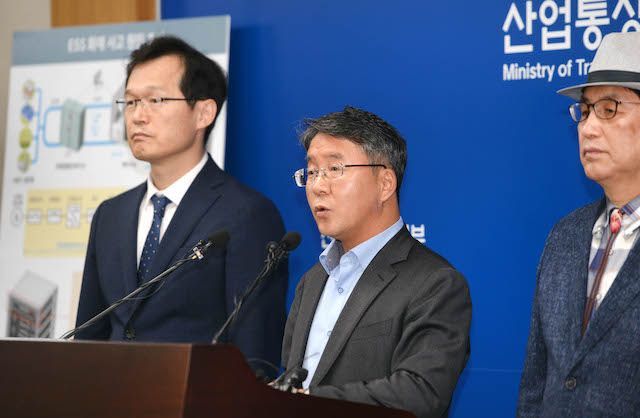Panel blames electric shock, poor management system for ESS fires, not companies
Industry Ministry to toughen safety measures to prevent casualties, damage
By Shin Ji-hyePublished : June 11, 2019 - 16:09
Ending a five-month-long probe into energy storage systems that caught fire, the South Korean government blamed defects in devices, poor management and systems, without holding companies accountable for the fires.
On Tuesday, a private-public joint committee, formed in January to look into the series of fires, announced the results of the probe, saying multiple factors played a role in the 23 fires that occurred over the past year.
It highlighted four factors: a lack of battery protective systems for electrical shocks; insufficient management of the operation environment; inattention to installation; and a lack of ESS integrated control and protection systems.
Manufacturing defects were found in some of the battery cells of one manufacturer, the name of which was withheld, but no fire occurred during verification tests in which the defects were examined.
Asked who should be held responsible for the fires, Park Jung-wook, the chief of the Industry Ministry’s product safety policy division, said during a press briefing, “A battery maker should take overall responsibility even though it does not make all of the components (of ESSs).”
The government will not, however, hold any individual company accountable because the companies did not violate any laws or rules due to the absence of related laws and rules in the nation.
“For the violation of clauses of each firm, companies themselves can address the issues in court,” he said.
On Tuesday, a private-public joint committee, formed in January to look into the series of fires, announced the results of the probe, saying multiple factors played a role in the 23 fires that occurred over the past year.
It highlighted four factors: a lack of battery protective systems for electrical shocks; insufficient management of the operation environment; inattention to installation; and a lack of ESS integrated control and protection systems.
Manufacturing defects were found in some of the battery cells of one manufacturer, the name of which was withheld, but no fire occurred during verification tests in which the defects were examined.
Asked who should be held responsible for the fires, Park Jung-wook, the chief of the Industry Ministry’s product safety policy division, said during a press briefing, “A battery maker should take overall responsibility even though it does not make all of the components (of ESSs).”
The government will not, however, hold any individual company accountable because the companies did not violate any laws or rules due to the absence of related laws and rules in the nation.
“For the violation of clauses of each firm, companies themselves can address the issues in court,” he said.

The ministry will not force them to recall products because recalls only apply to consumer goods. The companies, however, are now recalling defective products voluntarily to protect their own business interests, the ministry said.
But the companies will not get away with further fires, which may cause casualties or damage.
The government has announced a number of measures to toughen safety management throughout the entire process, from manufacturing and installing to operating energy storage systems. Specialized safety standards will also be enacted in September.
The safety measures include the revision of ESS installation standards to limit their capacity to a total of 600 per kilowatt hour to prevent overloads. When the storage systems are installed outdoors, they should be installed in separate, exclusive buildings.
As for companies that halted operation of their facilities in January at the government’s request, the ministry will make up for the losses by giving discounts on power rates. So far, operations have been suspended at 522 ESS facilities, around 35 percent of the 1,490 ESS facilities in Korea.
An energy storage system stores electrical energy and utilizes it for later consumption. This is in line with the government’s push toward eco-friendly energy policies, as it can supply energy when solar and wind power cannot generate energy, such as at night or when there is insufficient wind.
Korean ESS producers have grown to dominate the global market with around an 80 percent share of the global market. The global ESS market is expected to grow from $2.6 billion in 2018 to $5.5 billion by 2021, according to US research firm Navigant Research.
By Shin Ji-hye (shinjh@heraldcorp.com)



















![[Today’s K-pop] Treasure to publish magazine for debut anniversary](http://res.heraldm.com/phpwas/restmb_idxmake.php?idx=642&simg=/content/image/2024/07/26/20240726050551_0.jpg&u=)